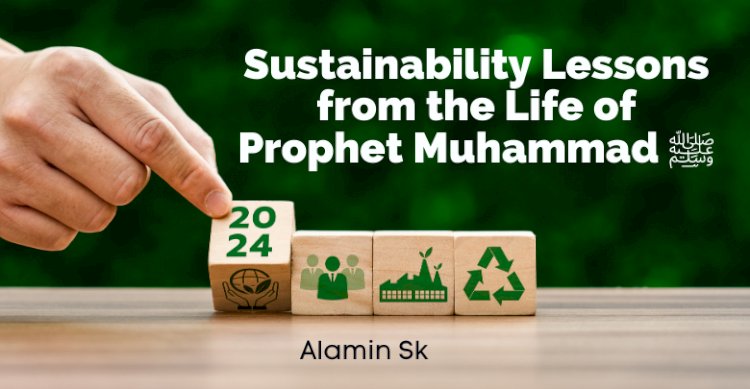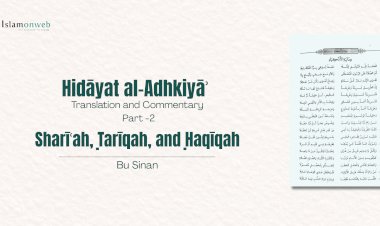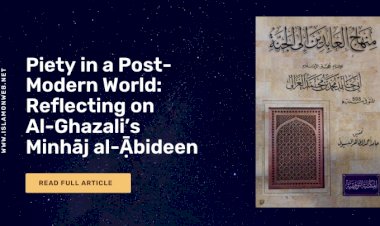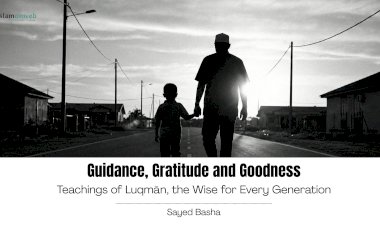Protecting our Environment: Sustainability Lessons from the Life of Prophet Muhammad ﷺ
In a world grappling with environmental degradation and climate change, the timeless teachings of Prophet Muhammad ﷺ offer profound insights into sustainable living. His life exemplifies a harmonious relationship with nature, emphasising the ethical treatment of the environment. This article delves into the environmental ethics demonstrated by Prophet Muhammad ﷺ and their relevance today.
History of World Environment Day
World Environment Day (WED) is celebrated on June 5th each year with participation from over 100 countries. Established by the United Nations General Assembly in 1972 during the Stockholm Conference on the Human Environment, it marked the beginning of the global movement for environmental preservation. The first World Environment Day was held in 1973, spearheaded by the United Nations Environment Programme (UNEP). The day aims to raise awareness and promote actions to protect our environment, encouraging global participation in addressing pressing environmental issues.
The Prophetic Embrace of Nature
Prophet Muhammad ﷺ viewed the natural world as a sign of Allah’s creation, deserving of respect and care. His relationship with nature was not merely utilitarian but deeply spiritual. He often retreated to nature for reflection and prayer, illustrating a profound connection with the environment.
Water Conservation: A Prophetic Priority
One of the most striking aspects of Prophet Muhammad’s ﷺ environmental ethics is his emphasis on water conservation. Despite living in the arid Arabian Peninsula, where water scarcity was a constant challenge, he advocated for its judicious use. He said, “Do not waste water even if you perform your ablution on the banks of an abundantly flowing river” (Ibn Majah).
This teaching is profoundly relevant today as the world faces water shortages. Prophet Muhammad ﷺ emphasised minimal use, highlighting that conservation should be practised even in abundance. Modern practices can draw inspiration from this principle, promoting water-saving technologies and habits. Simple actions such as fixing leaks, using water-efficient appliances, and educating communities about water conservation can make a significant impact.
Planting Trees: A Charitable Act
Prophet Muhammad (SAW) recognised the importance of trees in sustaining life. He encouraged the planting of trees and regarded it as an act of charity. He said, “If a Muslim plants a tree or sows seeds and then a bird or a person or an animal eats from it, it is regarded as a charitable gift (Sadaqah) for him” (Bukhari).
This prophetic advice underscores the ecological benefits of afforestation and reforestation, crucial in combating climate change and maintaining biodiversity. Contemporary environmental movements can incorporate this teaching, encouraging communities to plant trees and protect forests as acts of collective goodwill. Initiatives such as community tree-planting events, urban greening projects, and reforestation programs can be inspired by this teaching.
Sustainable Agriculture: Respecting the Earth
Prophet Muhammad ﷺ practised and promoted sustainable agriculture. He encouraged moderation in farming and warned against the over-exploitation of land. He said, “Whoever brings dead land to life, that is, cultivates wasteland, for him is a reward therein” (Sunan al-Tirmidhi).
This principle aligns with modern concepts of sustainable agriculture, which emphasize soil health, crop diversity, and minimal use of chemical inputs. By adopting sustainable farming practices, we can ensure food security and environmental health for future generations. Practices such as crop rotation, organic farming, and permaculture can be seen as modern applications of the Prophet's teachings.
Animal Welfare: Compassionate Treatment
The Prophet’s ﷺ compassion extended to animals, emphasizing their humane treatment. He warned against overburdening animals and instructed that they should be well-fed and cared for.
Abu Huraira reported: The Prophet (peace and blessings be upon him) said, “While a man was walking along a path, he became very thirsty. He found a well, climbed down into it, drank, and climbed out. Then he saw a dog panting and eating mud out of extreme thirst. The man said, ‘This dog has become as thirsty as I was.’ So he climbed back down into the well, filled his shoe with water, held it in his mouth, climbed out, and gave the water to the dog. Allah appreciated his deed and forgave him.” They said, “O Messenger of Allah, is there a reward for us in serving animals?” He said, “There is a reward for serving any living being” (Bukhari & Muslim).
Abdullah ibn Ja’far reported that the Messenger of Allah (peace be upon him) entered a garden belonging to a man from the Ansar. There was a camel in it. When the Prophet (peace be upon him) saw the camel, it grunted, and its eyes shed tears. The Prophet (peace be upon him) came to it and wiped its head, and it calmed down. He then asked, “Who is the owner of this camel? Whose camel is this?” A young man from the Ansar came and said, “It belongs to me, O Messenger of Allah.” The Prophet (peace be upon him) said, “Do you not fear Allah regarding this beast which He has given you? It has complained to me that you starve it and overwork it” (Ahmad and Abu Dawud).
Today, this teaching is relevant in advocating for the ethical treatment of animals, whether in farming, research or as pets. It calls for reevaluating industrial farming practices and promotes the humane treatment of all living beings. This could include supporting free-range farming, reducing meat consumption, and advocating for better animal welfare standards globally.
Avoiding Waste: An Ethical Imperative
Prophet Muhammad ﷺ condemned wastefulness, encouraging his followers to use resources wisely. He said, “Waste not by excess, for Allah loves not the wasters” (Quran 7:31). This directive is particularly pertinent in today’s consumer-driven society where waste generation is a significant environmental issue.
Reducing waste, recycling, and reusing materials are practical steps inspired by this prophetic wisdom. By minimizing waste, we can reduce our environmental footprint and contribute to a more sustainable future. Efforts such as reducing single-use plastics, composting organic waste, and supporting the circular economy align with this principle.
Energy Conservation: Emulating the Prophet’s Simplicity
Prophet Muhammad ﷺ lived a life of simplicity and minimalism, which naturally led to lower energy consumption. He encouraged moderation and avoiding extravagance in all aspects of life. He said, “Simplicity is a part of faith” (Abu Dawud).
In today’s context, this can translate into energy conservation efforts. Using energy-efficient appliances, reducing unnecessary electricity use, and opting for renewable energy sources are modern ways to embody this prophetic teaching. Emphasizing sustainable living practices such as using public transportation, biking, and walking also reflects the simplicity that the Prophet (SAW) advocated.
Building Sustainable Communities: Lessons from the Prophet’s Leadership
Prophet Muhammad ﷺ fostered a sense of community and collective responsibility. He promoted fairness, justice, and equity, which are crucial for building sustainable communities. He said, “The believers in their mutual kindness, compassion, and sympathy are just like one body” (Bukhari).
This holistic approach to community welfare can be applied to modern environmental sustainability efforts. Encouraging community gardens, local recycling programs, and community-supported agriculture (CSA) initiatives can help build resilient and sustainable communities.
Conclusion: The Timeless Relevance of Prophetic Environmental Ethics
The environmental ethics demonstrated by Prophet Muhammad ﷺ offer valuable lessons for contemporary society. His teachings on water conservation, tree planting, sustainable agriculture, animal welfare, waste reduction, energy conservation, and community building are not only spiritually enriching but also practically relevant.
Incorporating these principles into modern environmental strategies can foster a more sustainable and harmonious relationship with nature. As we celebrate World Environment Day, let us draw inspiration from the life of Prophet Muhammad (SAW) and strive to emulate his example of environmental stewardship. By doing so, we honour his legacy and contribute to a healthier, more sustainable planet for future generations.
Alamin Sk is interested in History, the Current Muslim World, Islamic theology, Sufism, and Islamic History. He is also active in social media and religious activities.
References
- The Quran:
- Surah Al-A'raf (7:31): "O children of Adam! ...eat and drink: but waste not by excess, for Allah loves not the wasters."
- Surah Al-An'am (6:165): "It is He who has appointed you viceroys in the earth ... that He may try you in what He has given you."
- Hadith Collections:
- Sahih Bukhari:
- "There is none amongst the Muslims who plants a tree or sows seeds and then a bird or a person or an animal eats from it but is regarded as a charitable gift for him."
- "The believers, in their mutual kindness, compassion, and sympathy, are just like one body."
- Sunan Ibn Majah:
- "Do not waste water, even if you perform your ablution on the banks of an abundantly-flowing river."
- Sunan Abu Dawud:
- "Simplicity is a part of faith."
- "Whoever is kind to the creatures of God is kind to himself."
- Sunan al-Tirmidhi:
- "Whoever brings dead land to life, that is, cultivates wasteland, for him is a reward therein."
- Islamic Scholars and Texts:
- Al-Banna, Fatima. "Islam and Environment Protection." This text explores the comprehensive approach of Islam towards environmental conservation and sustainable living.
- Esposito, John L. "The Oxford Encyclopedia of the Islamic World." This reference work includes discussions on various aspects of Islamic teachings, including those related to environmental ethics.
- Contemporary Articles and Research:
- "Islam and the Environment" by Ibrahim Abdul-Matin, an exploration of Islamic principles in modern environmentalism.
- "The Green Deen: What Islam Teaches About Protecting the Planet" by Ibrahim Abdul-Matin, which outlines the principles of environmental stewardship in Islam.
- Academic Journals and Papers:
- Various journal articles and papers that analyze the environmental teachings of Islam and their application in contemporary contexts. For example, "Environmental Ethics in Islam: Principles, Practice, and Prospects" in the journal "Ethics, Place & Environment."
- United Nations Environment Programme (UNEP):
- Official website of UNEP for information on World Environment Day: [UNEP](https://www.unep.org/resources/factsheet/world-environment-day).
Disclaimer
The views expressed in this article are the author’s own and do not necessarily mirror Islamonweb’s editorial stance.
























Leave A Comment